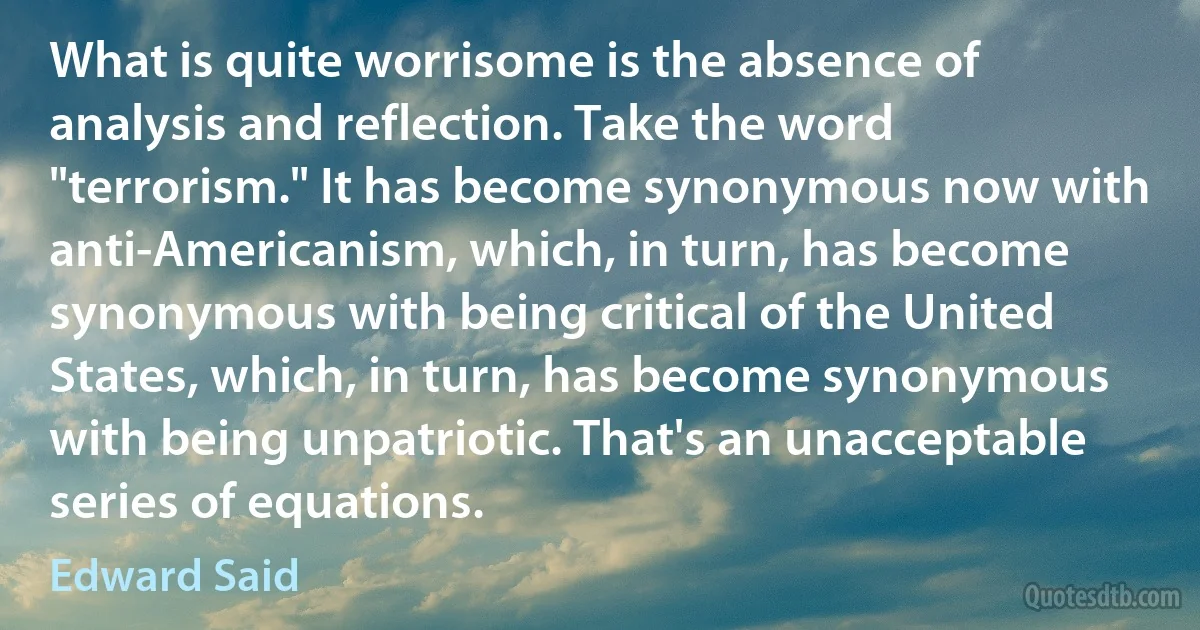Series Quotes - page 47
When I was a boy I was tremendously interested in scarecrows. They always seemed to my childish imagination as just about to wave their arms, straighten up and stalk across the field on their long legs. I lived on a farm, you know. It was natural then that my first character in this animated life series was the scarecrow, on whom I have taken revenge for all the mystic feeling he once inspired.
Then came the Tin Woodman, named because of the oddity of a Woodman made of tin, and then Pumpkinhead, and now, of course, the Wogglebug.

L. Frank Baum
When... we have a series of values of a quantity which continually diminish, and in such a way, that name any quantity we may, however small, all the values, after a certain value, are severally less than that quantity, then the symbol by which the values are denoted is said to diminish without limit. And if the series of values increase in succession, so that name any quantity we may, however great, all after a certain point will be greater, then the series is said to increase without limit.

Augustus De Morgan
Take a unit, halve it, halve the result, and so on continually. This gives-1 1⁄2 1⁄4 1⁄8 1⁄16 1⁄32 1⁄64 1⁄128 &c.;Add these together, beginning from the first, namely, add the first two, the first three, the first four, &c;... We see then a continual approach to 2, which is not reached, nor ever will be, for the deficit from 2 is always equal to the last term added.
...We say that-1, 1 + 1⁄2, 1 + 1⁄2 + 1⁄4, 1 + 1⁄2 + 1⁄4 + 1⁄8, &c.; &c.;is a series of quantities which continually approximate to the limit 2. Now the truth is, these several quantities are fixed, and do not approximate to 2. ...it is we ourselves who approximate to 2, by passing from one to another. Similarly when we say, "let x be a quantity which continually approximates to the limit 2," we mean, let us assign different values to x, each nearer to 2 than the preceding, and following such a law that we shall, by continuing our steps sufficiently far, actually find a value for x which shall be as near to 2 as we please.

Augustus De Morgan
The following is exactly what we mean by a LIMIT. ...let the several values of x... bea1 a2 a3 a4.... &c.;then if by passing from a1 to a2, from a2 to a3, &c.;, we continually approach to a certain quantity l [lower case L, for "limit"], so that each of the set differs from l by less than its predecessors; and if, in addition to this, the approach to l is of such a kind, that name any quantity we may, however small, namely z, we shall at last come to a series beginning, say with an, and continuing ad infinitum,an an+1 an+2.... &c.;all the terms of which severally differ from l by less than z: then l is called the limit of x with respect to the supposition in question.

Augustus De Morgan
Mantle played ball almost under a shroud of depression, because he always thought he was going to die an early death. But Mays probably thinks he's going to live forever. Mantle acted like a man who was doomed. Mays never did, even though he played long beyond his ability. I talked to Willie after the 1973 World Series, in which he looked terrible. I said, "What were you doing out there, Willie?" "Oh, I was having fun!" he told me. Mantle never had fun. Mays, on the other hand, seemed to be inoculated from all the pressure. He simply went beyond the usual frames of reference. If I were writing this, I'd say that he went beyond the usual frames of reverence. That's the way we all felt, and I think it was true for not only the press, but also for managers and other players. And this bled into the other pages of the newspaper.

Arnold Hano
Sophie's Choice is a fine, absorbing, wonderfully acted, heartbreaking movie. It is about three people who are faced with a series of choices, some frivolous, some tragic. As they flounder in the bewilderment of being human in an age of madness, they become our friends, and we love them.

Roger Ebert
All social phenomena are the result of a series of various causes, in most cases so inwardly related that it is quite impossible clearly to separate one from the other. We are always dealing with the interplay of various causes which, as a rule, can be clearly recognised but cannot be calculated according to scientific methods.

Rudolf Rocker
We had a lot of fun with Casey all through the Series. There never was anything abusive about him. We rode him just to hear his clownish comebacks. I know I kidded him plenty. And when he won the the 1 to 0 game, he ran around the bases with his thumb to his nose and his hand pointed to the Yankee bench. I think it was meant for me in particular as he tried to show me he, too, knew how to hit home runs. Ruppert didn't like it and later said it was undignified. But we didn't mind Casey having his fun.

Babe Ruth
My biggest home run thrill? The day I called that one on Root in the Yankee-Cub series. The whole crowd was riding me. I was riding 'em back with even rougher language. The Chicago bench was yelling "Onya-onya-onya-you big yellow bum." Root had thrown me two bad balls I didn't like. I protested both, then I pointed to the flag police in center field. I knew Root would feed me another just like the first two, so I moved up about eight inches closer and gave it the works. They tell me when they found that ball it was lopsided, shaped like an egg. I just got to thinking later what a terrible heel I'd have been that day if Root had struck me out, but I never thought of that till later. It's a good thing I didn't. What a mug I'd have been.

Babe Ruth
Hell no, it isn't a fact. Only a damned fool would do a thing like that. You know there was a lot of pretty rough ribbing going on on both benches during that Series. When I swung and missed that first one, those Cubs really gave me a blast. So I grinned at 'em and held out one finger and told 'em it'd only take one to hit it. Then there was that second strike and they let me have it again. So I held up that finger again and I said I still had that one left. Naw, keed, you know damned well I wasn't pointin' anywhere. If I'd have done that, Root would have stuck the ball right in my ear. And besides that, I never knew anybody who could tell you ahead of time where he was going to hit a baseball. When I get to be that kind of fool, they`ll put me in the booby hatch.

Babe Ruth
Nothing to it. Those Yankees were the best team. Figure it out. After we got going we won twelve straight World Series games-twelve in a row. It was murder. The Red Sox had the greatest outfield with Lewis, Speaker and Hooper. But the Yankees had the greatest punch baseball ever knew. We never even worried five or six runs behind. Ruth-Gehrig-Lazerri-Combs-Dickey-wham, wham, and wham-no matter who was pitching.

Babe Ruth
You get the picture. And so did BMW. When they bought the company they could have fitted a new body to one of their 7 Series. That's what Mercedes did to create the Maybach. But instead of wandering around the BMW spare-parts division saying, "What do we want?" the engineers fired up their computers and asked, "What do we need?". Plainly they looked at what Henry Royce and Charles Rolls were trying to achieve a hundred years ago, and thought, "Zis is vot ve must do also."

Jeremy Clarkson
I have a whole series of pictures that are, I mean in a sense, landscapes. Well, I wouldn't hold the landscape in front of me and translate it more abstractly into the painting, no. But I would - again in that American expedient thing you [Barbara Rose, earlier in the interview] were talking about - thinking ideas in my language. Sort of like today. 'Hm, bunch of roses', hm. 'Flags out the window', hm.... But once it got down on the surface I would say in 99 times out of a 100, out of 101, nobody would come along and say how come you put 'shoes' in a picture. I mean it would be too brown or too green.

Helen Frankenthaler



